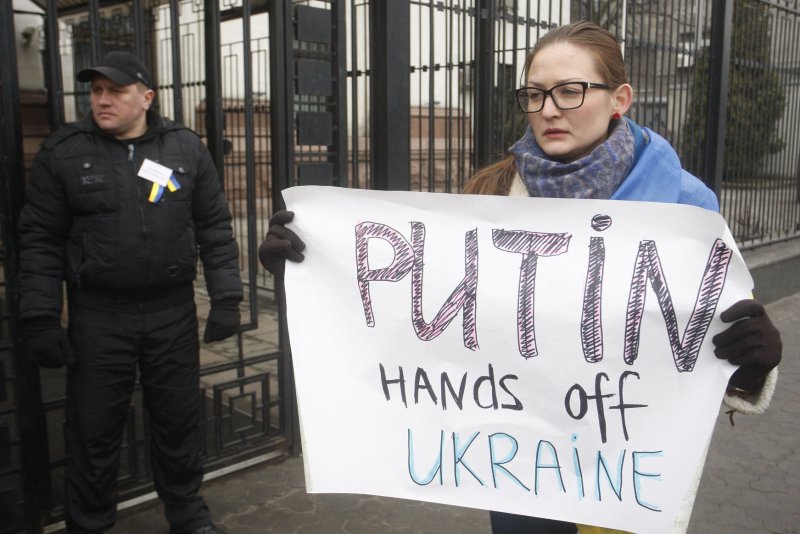1 of 3 | People protest against Russia about the situation in Crimea on Independence Square in Kyiv on March 2, 2014. File Photo by Ivan Vakolenko/UPI |
License Photo
Feb. 23 (UPI) -- In a speech this week formally recognizing the breakaway regions of Donetsk and Luhansk as independent from Ukraine, Russian President Vladimir Putin falsely attempted to make the case that Ukraine was stolen from Russia.
But historians and experts on the region said that while Ukraine's history is nuanced, even former Soviet leader Vladimir Lenin recognized the region had a unique national identity that existed well before the Soviet Union came into being.
Since Ukraine's independence from the Soviet Union more than 30 years ago, the country has walked a tight rope between reinforcing relations with neighboring Russia and some leaders' desires to establish alliances with Western Europe. That delicate balance has yet again come to a head in recent months as Putin amasses thousands of troops along Russia's border with Ukraine.
Putin, on Monday, said modern Ukraine only existed because Lenin made the mistake of giving the country autonomy within the Soviet Union.
"Modern Ukraine was entirely and fully created by Russia, to be more precise the Bolshevik, communist Russia," Putin said.
"This process started practically right after the 1917 revolution, and Lenin and his associates did it in a way that was extremely harsh on Russia -- by separating, severing what is historically Russian land."
But Timothy Snyder, who teaches history at Yale University, told MSNBC that Putin's revisionist interpretation of Ukraine's history is inaccurate. Lenin, he said, recognized a distinct Ukraine because he knew the region had its own unique history.
"It's very strange when you're surrounded by the reality of Ukrainian history, to hear a distant tyrant declare that the thing doesn't exist. Obviously, he's wrong," Snyder said.
He said Ukraine dates back to before the existence of the Soviet Union, and some elements of its history stretch to the Middle Ages.
Ukrainians voted in favor of independence from the Soviet Union and elected Leonid Kravchuk as their first president on Dec. 5, 1991.
The Soviet Union fell within days, bringing an end to nearly seven decades of existence to the socialist state.
Shortly after Kravchuk's election, he establishes diplomatic relations with the North Atlantic Treaty Organization, but doesn't seek membership.
Ukraine's possible joining of the alliance is at the heart of its current conflict with Russia. Moscow wants NATO to agree not to allow Ukraine to join and for its troops to return their military deployment to 1997 positions.
Ukrainians elect Leonid Kuchma as their second president in 1994, and over the next decade he works to transform the former Soviet republic into a capitalist country, according to NPR. He sought to improve relations with Russia, particularly economic ties.
The 2004 presidential election deepened tensions between Ukraine and Russia as Viktor Yanukovych -- supported by both Kuchma and Putin -- lost in a runoff against opposition leader Viktor Yushchenko. Yanukovych was accused of election fraud after initially winning the election, prompting the so-called Orange Revolution, three months of anti-corruption protests in Kyiv and other locations throughout Ukraine.
![]()
Ukrainian President Viktor Yushchenko speaks to the press at the White House on April 4, 2005. File Photo by Roger L. Wollenberg/UPI
Yushchenko, who was determined to have been poisoned during the election, was ultimately declared Ukraine's third president.
Yushchenko petitioned to have Ukraine join NATO in 2008, but under pressure from Russia, France and Germany side against it.
Yanukovych was finally elected president in 2010 and pushed for better relations with both Russia and Western countries. He also dropped Ukraine's bid to join NATO.
He faced widespread protests and calls for his resignation in 2013 when he refused to sign a trade pact with the European Union. He said that such an alliance would hurt Ukraine's economy and that Kyiv should instead focus on strengthening its ties with Russia.
Months of protests as part of the so-called Maidan Revolution -- or Revolution of Dignity -- left more than 100 people dead and hundreds more injured. The demonstrations resulted in a unanimous vote in parliament to relieve Yanukovych of power, a move Russia viewed as an illegal coup.
![]()
Anti-government protesters clash with the Ukrainian riot police at a barricade on February 19, 2014. File Photo by Ivan Vakolenko/UPI
Russia invaded Ukraine, taking control of the Crimean Peninsula, which Moscow would annex in March 2014. Russian-backed separatists also declared independence in the self-described Donetsk and Luhansk People's Republics in the Donbas region of eastern Ukraine, which borders Russia.
Those two breakaway republics were formally recognized on Monday by Putin, who ordered "peacekeeping" troops into the regions ahead of an attack on Ukraine. European leaders have called such recognition of the regions as a violation of the Minsk Agreements, which ended the 2014 conflict between Russia and Ukraine, and established Ukrainian law in the Donbas region.
U.S. President Joe Biden said Wednesday that Russia's installation of troops in the Donbas region constituted an "invasion."
"Yesterday, Vladimir Putin recognized two regions of Ukraine as independent states, and he bizarrely asserted that these regions are no longer a part of Ukraine and their sovereign territory," he said. "To put it simply, Russia announced it is carving out a big chunk of Ukraine."
"Who in the Lord's name does Putin think gives him the right to declare new so-called countries on territory that belongs to his neighbors?" Biden asked. "This is a flagrant violation of international law and demands a firm response from the international community."

















